Note: “The CAUSE” is used to translate the Divine Name YHVH, based on the philosophical idea of God as the Prime Mover and on the interpretation of the Name as a causative form of the copula – “causes to be.” This translation also uses the plural pronouns They/Their/Them to refer to God as a pluralis majestatis, and to avoid the implications of God being assigned a gender. (Find Ibn Ezra’s commentary on Genesis 1:1 for a discussion of the pluralis majestatis when referring to God.) All divine referents (pronouns, epithets, names) are rendered in unicase.
| Source (Hebrew) | Translation (English) |
|---|---|
בְּאַרְבָּעָה בְּחֹדֶשׁ אִיָּר רָאִיתִי בָּרוּחַ בְּמַרְאֶה הַקֹּדֶשׁ וְכׇל־נְבוּאָיו וְהִתְפַּלַּ֗לְתִּי לִפְנֵ֥י יְ֝הֹוָ֗ה וְאָמַֽרְתִּי׃ |
On the fourth of the month of Iyyar I looked in spirit into the holy sight and all Their prophecies, and I prayed before the Cause and said: |
בָּ֭רוּךְ כִּי־שָׁבַ֣ר רְשָׁעִ֑ים וְ֝הֶעֱמִ֗יד קֶ֥רֶן צַדִּיקִֽים׃ |
Blessed! For They broke the wicked, and set up the horn of the righteous. |
וְדַעֲת֣וֹ וְ֭חׇכְמָתוֹ בְּכׇל־לִבִּ֑י כִּ֤י אַתָּ֣ה ה֖וּא שׁוֹפֵ֣ט הַצֶּֽדֶק׃ |
And Their knowledge and wisdom are in all my mind,[1] Lit. “heart.” The heart is seen in traditional Jewish texts as the seat of wisdom. for You are the Judge of right. |
וְלֹא־יֵצֵ֣א מִ֭לְּפָנֶֽיךָ מִֽשְׁפַּט־שָׁ֑קֶר כִּי־אִ֣ם אֱמֶ֣ת וֶאֱמוּנָֽה׃ |
And no false judgment comes out from before You, only truth and faithfulness. |
תִּתֵּ֣ן לָ֭אָדָם כִּדְרָכָ֑יו וְכִפְרִ֥י מַ֝עֲלָלָ֗יו תָּשִׁ֥יב לֽוֹ׃ |
You grant a human per his paths, and by the fruit of his deeds You return upon him. |
אֵ֣ין כַּחַ֣שׁ בְּכׇל־מַעֲשֶׂ֑יךָ וְאֵ֣ין כָּ֝זָ֗ב בְּכׇל־דְּבָרֶֽךָ׃ |
No deceit is in all Your deeds, nor is there falsehood in all Your words. |
כׇּל־פׇּ֭עָלְךָ תָּמִ֣ים יַ֑חַד וְעָ֖וֶל בַּל־יִמָּצֵ֥א בְּמַעֲשֶֽׂךָ׃ |
All Your acts are together pure, and injustice is not found in Your work. |
כְּנָהָ֣ר שׁ֭וֹטֵף הִרְבֵּ֥יתָה מִשְׁפָּטֶ֑ךָ וּכְזֶ֥רַע מְ֝בֹרָ֗ךְ הִצְמַ֥חְתָּה צִדְקָתֶֽךָ׃ |
Like a flowing river You increased Your judgments, and like a blessed seed You planted Your righteousness. |
אַשְׁרֵ֣י יִ֭זְכֶּה בִּקְדֻשָּׁתֶ֑ךָ יְסַפֵּ֥ר כְּ֝בוֹדְךָ֗ בְּכׇל־יֽוֹם׃ |
Content is one who merits Your holiness, who will tell Your glory every day. |
עֶ֭זְרָתִי מִלִּפְנֵ֣י כְּבוֹדֶ֑ךָ לְאוּכַ֥ל לָ֝נֶצַ֗ח לַעֲמֹ֥ד בִּרְצוֹנֶֽךָ׃ |
My help is from before Your Glory, that I may forever stand in Your desire. |
כִּ֣י תְּמ֣וֹל וְהַיּ֑וֹם אַשְׁרֵ֖י שׁוֹמְרֵ֣י פִּקּוּדֶֽיךָ׃ |
For yesterday and today, content are those who keep Your precepts. |
[…] |
[…] |
This is the fourth psalm found in MS RNL Antonin 798 in the Antonin Collection, St. Petersburg. A transcription and English translation of the work was most recently published in Has Psalm 156 Been Found? With Images of MS RNL Antonin 798 (2018) by James H. Charlesworth with the assistance of Brandon L. Allen. This vocalized and cantillated transcription and translation was made by Isaac Gantwerk Mayer. Most of the more recent scholarship considers the work to either be from the Qumran community (that produced the Dead Sea Scrolls) or from the same period and culture. Adding to his survey of scholarly opinion on the date and origin of the work, Charlesworth writes, “While I would like to affirm the hypothesis that the author of MS RNL Antonin 798 knew the Qumran Psalms Scroll, that conclusion has not been demonstrated; we can only be confident that the author of MS RNL Antonin 798 shared the same culture and time with the author or scribe of the Psalms Scroll, the Self-Glorification Hymn, and the Testament of Judah” (p. 67). –Aharon Varady
Source
Notes
| 1 | Lit. “heart.” The heart is seen in traditional Jewish texts as the seat of wisdom. |
|---|

“בְּאַרְבָּעָה בְּחֹדֶשׁ אִיָּר | On the 4th of Iyyar — the fourth psalm of the “Additional Psalms” from the Cairo Geniza, MS RNL Antonin 798” is shared through the Open Siddur Project with a Creative Commons Attribution-ShareAlike 4.0 International copyleft license.
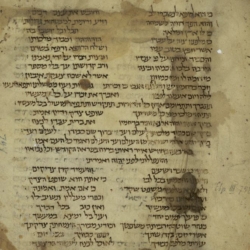
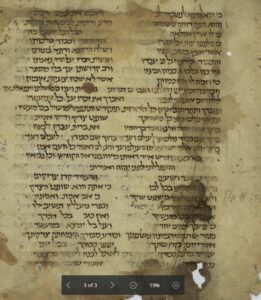
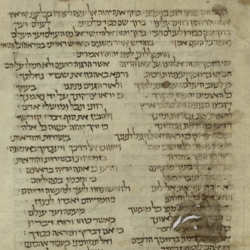
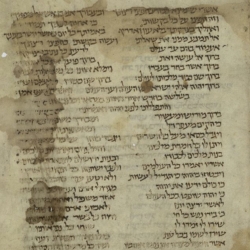
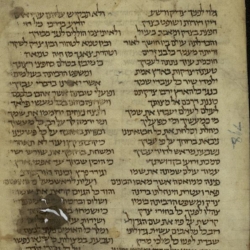






Leave a Reply